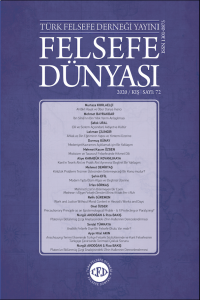Öz
According to Michael Gagarin, Hesiod’s notion of dikê is not a moral notion, and it has to be disassociated from the moral connotations that it will start to assume later in the fifth century. For Gagarin, an ad hoc settlement of particular disputes in city courts is all there is to Hesiodic dikê. This article objects to this interpretation of Hesiod and claims that Hesiod is working with a more substantial idea of dikê in his Works and Days. According to my reading, however, Hesiod’s more substantial notion of dikê still does not have moral content. I provide my reasons for this latter claim by showing that “work”, for Hesiod, does not have a moral significance, either.
Anahtar Kelimeler
Kaynakça
- Beall, E. F. (2005/2006). “Hesiod’s Treatise on Justice: ‘Works and Days’ 109-280”, The Classical Journal, vol. 101 (2): 161-182.
- Claus, D. B. (1974). “Defining Moral Terms in Works ad Days”, Transactions of the American Philological Association, vol. 107: 73-84.
- Carrière, J.-C. (1986). "Les démons, les héros et les rois. Les ambiguïtés de la justice dans le mythe hésiodique des races et la naissance de la Cité", in: Les Grandes figures religieuses. Fonctionnement pratique et symbolique dans l'Antiquité, Annales Littéraires de l'Université de Besançon : 193-261.
- Clay, J. S. (2003). Hesiod’s Cosmos, Cambridge University Press.
- Crubellier, M. (1996). « Le mythe comme discours : le récit des cinq races humaines dans Les Travaux et Les Jours », in Le métier du mythe, eds. Fabienne Blaise, Pierre Judet de La Combe, Philippe Rousseau, Presses Universitaires du Septentrion : 431-463.
- Dickie, M. W. (1978). “Dikê as a Moral Term in Homer and Hesiod”, Classical Philology, vol. 72 (2): 91-101.
- Gagarin, M. (1973). “Dikê in the Works and Days”, Classical Philology, vol. 68 (2): 81-94.
- Gagarin, M. (1974a). “Dikê in Archaic Greek Thought”, Classical Philology, vol. 69 (3): 186-197.
- Gagarin, M. (1974b). “Hesiod’s Dispute with Perses”, Transactions of the American Philological Association, vol. 104: 103 -3111.
- Gagarin, M. (1992). “The Poetry of Justice. Hesiod and The Origins of reek Law”, Ramus (21): 61- 78.
- Most, Glenn M. (2006). Hesiod. Theogony, Works and Days, Testimonia, (translation and edition), Harvard University Press.
- Stewart, D. (1970). "Hesiod and History", Bucknell Review (18): 37-52.
- Vergados, A. (2014). “Defining Dikê in Hesiod’s Works and Days”, in Crime and Punishment in Homeric and Archaic Epic, eds. M. Christopoulos and M. Paizi-Apostolopoulou, Ithaca: 367-378.
- Vernant, J.P. (1965). “Le mythe hésiodique des races » in Mythe et pensée chez les Grecs, Paris : 13-79.
- Vernant, J.P. (1974). « Le mythe prométhéen chez Hésiode », in Mythe et societe en Grece ancienne, Paris : 178-194.
- Vernant, J.P. (1985). « Méthode structurale et mythe des races », in Histoire et Structure, Paris : 43-60.
Öz
Michael Gagarin’e göre Hesiodos’taki dikê anlayışı ahlaki değildir; ve Hesiodos’un dikê anlayışı bu kavramın daha sonra beşinci yüzyılda alacağı ahlaki anlamlardan ayrıştırılmalıdır. Gagarin’e göre, Hesiodosçu dikê, sitenin mahkemelerindeki şahsi ihtilaflara ad hoc çözümler bulunması ile sınırlıdır. Bu makale Hesiodos’un bu yorumuna itiraz etmekte ve İşler ve Günler’de Hesiodos’un daha tözel bir dikê anlayışına sahip olduğunu iddia etmektedir. Ancak burada savunulan yoruma göre de, Hesiodos’un bu daha tözel dikê anlayışı ahlaki değildir. Bu iddia için gerekçelerimi Hesiodos’a göre “iş”in de ahlaki bir içeriği bulunmadığını göstererek açıklamaya çalışıyorum.
Kaynakça
- Beall, E. F. (2005/2006). “Hesiod’s Treatise on Justice: ‘Works and Days’ 109-280”, The Classical Journal, vol. 101 (2): 161-182.
- Claus, D. B. (1974). “Defining Moral Terms in Works ad Days”, Transactions of the American Philological Association, vol. 107: 73-84.
- Carrière, J.-C. (1986). "Les démons, les héros et les rois. Les ambiguïtés de la justice dans le mythe hésiodique des races et la naissance de la Cité", in: Les Grandes figures religieuses. Fonctionnement pratique et symbolique dans l'Antiquité, Annales Littéraires de l'Université de Besançon : 193-261.
- Clay, J. S. (2003). Hesiod’s Cosmos, Cambridge University Press.
- Crubellier, M. (1996). « Le mythe comme discours : le récit des cinq races humaines dans Les Travaux et Les Jours », in Le métier du mythe, eds. Fabienne Blaise, Pierre Judet de La Combe, Philippe Rousseau, Presses Universitaires du Septentrion : 431-463.
- Dickie, M. W. (1978). “Dikê as a Moral Term in Homer and Hesiod”, Classical Philology, vol. 72 (2): 91-101.
- Gagarin, M. (1973). “Dikê in the Works and Days”, Classical Philology, vol. 68 (2): 81-94.
- Gagarin, M. (1974a). “Dikê in Archaic Greek Thought”, Classical Philology, vol. 69 (3): 186-197.
- Gagarin, M. (1974b). “Hesiod’s Dispute with Perses”, Transactions of the American Philological Association, vol. 104: 103 -3111.
- Gagarin, M. (1992). “The Poetry of Justice. Hesiod and The Origins of reek Law”, Ramus (21): 61- 78.
- Most, Glenn M. (2006). Hesiod. Theogony, Works and Days, Testimonia, (translation and edition), Harvard University Press.
- Stewart, D. (1970). "Hesiod and History", Bucknell Review (18): 37-52.
- Vergados, A. (2014). “Defining Dikê in Hesiod’s Works and Days”, in Crime and Punishment in Homeric and Archaic Epic, eds. M. Christopoulos and M. Paizi-Apostolopoulou, Ithaca: 367-378.
- Vernant, J.P. (1965). “Le mythe hésiodique des races » in Mythe et pensée chez les Grecs, Paris : 13-79.
- Vernant, J.P. (1974). « Le mythe prométhéen chez Hésiode », in Mythe et societe en Grece ancienne, Paris : 178-194.
- Vernant, J.P. (1985). « Méthode structurale et mythe des races », in Histoire et Structure, Paris : 43-60.
Ayrıntılar
| Birincil Dil | İngilizce |
|---|---|
| Konular | Felsefe |
| Bölüm | Araştırma Makaleleri |
| Yazarlar | |
| Yayımlanma Tarihi | 15 Aralık 2020 |
| Gönderilme Tarihi | 14 Haziran 2020 |
| Yayımlandığı Sayı | Yıl 2020 Sayı: 72 |

